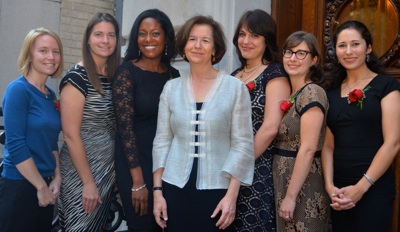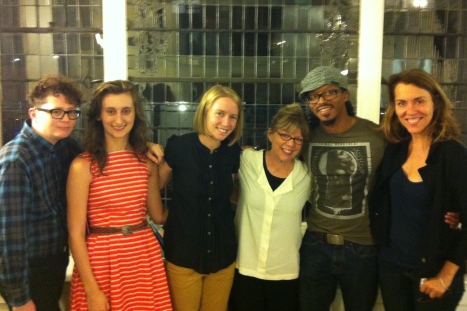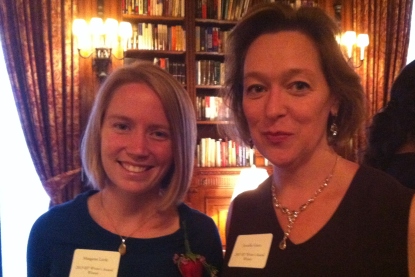Matthew Muller’s “The Man in the River”
A new piece of flash fiction by alumni Matthew Muller (fiction, ’10) appears in Stone Highway Review:
The small family takes a road trip, husband wife and daughter. The husband drives, full of vigor, the road before him. The wife wears a serene expression and wind blows through her hair. If you had to, you might say that they were an archetype of man and woman, at least this is what he tells himself, this is what the set-up of a family on a trip in a car suggests. Man. Woman. Child. The open window shows low green mountains and yellow fields passing. Later, he pulls the car up by a gravelly bend in the river, the water deep, a swimming hole. The husband grabs the rope, extends out, drops in yelling and comes up blowing water. Among them, he is the big wild one, the man. The small child giggles and screams “Daddy!” But he feels strangely fraudulent in the water, knowing others who are in fact, more wild than him. The wife laughs too, and with a kind of heaviness in his chest he grabs and lifts the water in a grand gesture up into the air where it becomes a glistening sheet distending drops. At night, when there is a sound from outside the tent, he is first to jump up with his flashlight to see what is there. He knows it is not bravery really that makes him do it, it is more his duty as man, a role he is playing. Unthinkingly he zips open the tent door. Realistically, he knows there will always be men in the darkness stronger than him. His wife often calls him brave and says he is the best of this, of that, insistently, even though they both know it isn’t really true. Right? Does she know she is lying? There have always been better men than him, stronger men, smarter men, men more sensitive, this is true no matter how hard he tries to make it otherwise, and in her smile, when she tells him the opposite, she knows it too, she has seen them. As he stands outside the tent, staring into a darkness he cannot truly parse, he is beginning to feel that he doesn’t actually care about the dark trees surrounding them, their constant threat, and the kind of insecurity and rebellion they foster in him, trees rushing in a night wind with a tremulous and ominous peace all their own, a peace that is age old and seems to both frame him individually and erase him simultaneously, trees all down the valley, all up the mountainsides, endless prairies of trees, and the small family among them, the dim ray of the flashlight moving from trunk to trunk.
Greg Pierce featured on NPR’s “All Things Considered”
Alumni Greg Pierce’s (fiction, ’12) new collaboration with Broadway composer John Kander is featured on NPR’s “All Things Considered”:
Broadway composer John Kander is a living legend: With his songwriting partner, the late Fred Ebb, he created the scores for the smash hit musicals Cabaret and Chicago,as well as the enduring anthem “New York, New York.”
Now, at 86, Kander has a new writing partner — and a new musical, The Landing,opening off-Broadway Wednesday.
“Life Goes On”
For a guy with such an illustrious history, Kander isn’t terribly nostalgic. He’s a writer, and he likes to write. And despite the pain of losing a collaborator of more 40 years, he knew the time had come to move on.
“Fred and I had a wonderful long time together, and it was a huge part of my life, but life goes on,” Kander says. “And I never thought about living in the past. I just don’t.”
So a few years ago, Kander called up Greg Pierce, a young playwright and short-story author he’d been mentoring, and asked him if he wanted to work on a small-scale musical.
“The idea was to have four actors and four instruments, and have it be very, very, very, very, very small,” he says.
And that was OK with Pierce.
“When I got that phone call from John, I mean — that was one of the most exciting phone calls I’ve ever gotten,” he says. “And the thought had crossed my mind that maybe we could work together. I would never have asked him, because of, you know, where I was and where he is. [But] it’s just been a real joy. Every work session has been a joy.”
And working with the 35-year-old playwright has made Kander approach composing with a new vigor.

Greg Pierce and John Kander, on the carpet at a cast photo session for The Landing in September, are 51 years apart in age, but the two report working smoothly together.
“Working together as we do has made me write in a different way,” he says. “And it’s been a great adventure.”
Everybody Wants Something
The Landing is an evening of three small musicals that play like short stories. Each one has a narrator, and each ends with a surprising plot twist.
In the first story, a bright but lonely boy befriends a carpenter and learns about the constellations and the mythology behind them, as well as some painful life lessons. In the second, a woman who loves gangster movies buys a brick from the St. Valentine’s Day Massacre and it comes to life, with comic and crazy consequences. In the third, a gay couple adopts a boy who seems too good to be true — and it turns out he is.
“In these pieces,” Pierce says, “someone wants something really badly, and they don’t know what they’re in for!”
Walter Bobbie, who directed the hit revival of Kander and Ebb’s Chicago that’s still running on Broadway, has staged The Landing, eliciting finely etched performances from the tiny cast of four, each playing multiple roles.
“The consequences to everybody’s desires in each of these stories is remarkably different — and sometimes, both simultaneously sad and romantic,” Bobbie says. “There’s kind of a lyric quality to these pieces that I found beautiful.”
“An Uncle” by Peg Alford Pursell
A new issue of Tupelo Quarterly features work by several Warren Wilson MFA alumni, including a story by Peg Alford Pursell (fiction, ’96).
An Uncle
An uncle is a babysitter in a pinch, which happens rarely, only when Mother has to run out to comfort her friend Suzanne, an emergency that isn’t that rare, in Dad’s opinion, but an uncle is someone who doesn’t take sides in the matter. He comes to the rescue, and sits on the sofa watching a wrestling match on TV, and says Stop it now! after you and your sister have slapped each other’s arms burning red with your Barbie dolls. He gives you a look that makes your stomach heavy and you feel pretty sure he knows you’re to blame – you’re the oldest. You sing all the Beatles songs you can think of, to impress him with how you know the words to so many songs. He’s like your dad in the way that’s he’s not that interested and stares straight ahead at the action on the screen. You brush all your hair from the back of your head forward, smooth it down over your forehead, past your eyebrows and into your eyes to look like Ringo, who isn’t the cutest Beatle but has something special. “Look, Uncle Lew!” He glances over and gives a snort, and you feel a little better.
An uncle is someone your mother likes a lot, and when he drops by unexpectedly, she turns off the iron and sits down with him at the kitchen table, where they drink Pepsis or RC Cola if it’s on sale at the Shop n’ Save, and eat snacks, probably chocolate macaroons, and his voice flows low from out there, and she giggles and giggles again. There is something high and twinkly about that laugh, like the sound of the glass wind chimes suspended outside the neighbor’s door that you wish you could talk her into buying to hang on your porch – but one day. When you grow up and you live in your own house, then. Then.
“Two Musketeers” by Joan Frank
A new issue of Tupelo Quarterly features work by several Warren Wilson MFA alumni, including a new story by Joan Frank (fiction, ’96).
Two Musketeers
The man and the woman slammed themselves into the car with relief.
Certainly, the little beach cottage had been all they might have wished for. Its heating didn’t function, but they’d managed. The fireplace had finally more or less done what it was touted to do. They’d eaten well, walked on the cold, wet sand (a silver wafer of sun for an hour; better than none)—watched a funny video, made love. The hot water out of the taps was weak and intermittent; they’d solved that by soaking in the little outdoor tub. A real retreat. They’d kissed and joked and nuzzled like Mr. and Mrs. Bear.
Now they were pointed toward home, laughing, eager to be thoroughly warmed by forced-air heating, amid strong reading lights again.
But the fog was a new element.
The fog was a stranger who’d entered the movie of themselves.
It gulped the scenery: majestic miles of beach. The green gentle hills rolling back, back. The apple groves gilded with autumn leaves like burnished coins, rows tumbling toward the roadway in amber light. The eucalyptus groves, the serene river. The little towns nestled in the leafy middle distance.
Abigail Wender in Tupelo Quarterly
A new issue of Tupelo Quarterly features work by several Warren Wilson MFA alumni, including translations of Sarah Kirsch’s poetry by Abigail Wender (poetry, ’08), with Hella Von Bonin.
The Little Prince
My eyes have messed me up, so I see Earth
Above me walk on clouds now, where
Directions are, no paths, the mountains
Hang down under as do the trees
With birds inside, out of the houses
Fall pillows, scribbled papers
Now and then a threat, the people
Walk on their heads—their certainty
Frightens, I can’t reach their chimneys
Greet
The twinkle of my abandoned window
As in the past the evening star
Nate Pritts in Tupelo Quarterly
A new issue of Tupelo Quarterly features work by several Warren Wilson MFA alumni, including two poems, “Withdrawl” and “After Picking Apples,” by Nate Pritts (poetry, ’00).
Withdrawl
All the leaves on the trees
are yellow explosions.
They’re dead or they’re dying.
It’s too beautiful to process
& it never relents.
I look out over the lake
filled with so many chemicals.
The water is grey like the sky
is grey like even
the grass. I can feel the war
coming.
I know nothing will be left.
I create a fake Facebook profile
so I can check on the people
who I’ve blocked or who blocked me.
I name him Robert Lowell.
Enemies upon enemies.
I can’t believe this is my Wednesday
afternoon activity.
There’s too much
psychic backlash these people
interacting with my persona.
I telephone my boss tell her
I can’t teach any classes today
since I have already seen how this ends.
Elizabeth Eslami in Tupelo Quarterly
A new issue of Tupelo Quarterly features work by several Warren Wilson MFA alumni, including an essay by Elizabeth Eslami (fiction, ’03) entitled, “Spikes and Rivers: The Work of Joe Wilkins,” followed by an interview with Wilkins:
What I’m looking for, always, is writing that works me over like a crowbar. That bruises, yes, but also that breaks the skin, so it can slip under and stay put. Writing that fractures bone, so some part of me has to forever knit around someone else’s story. I don’t want writing I can shake off or walk away from.
It’s pretty simple. Great writing does damage. And I don’t want to heal from it, ever.
Alumni and Faculty at The Rona Jaffe Writers’ Award Ceremony
Warren Wilson alumni and faculty gathered for the 2013 Rona Jaffe Writers’ Award Ceremony and Reading in New York last month. Alumna Margaree Little (poetry, ’12) was awarded the prize, among five others:
 Left to Right: Margaree Little (poetry, ’12) with fellow award recipients Jill Sisson Quinn, Tiffany Briere, Kristen Dombek, Ashleee Crews and Kristin Valdez Quade. Joan Wickersham, the guest speaker, is pictured at center. Photo Credit: Star Black.
Left to Right: Margaree Little (poetry, ’12) with fellow award recipients Jill Sisson Quinn, Tiffany Briere, Kristen Dombek, Ashleee Crews and Kristin Valdez Quade. Joan Wickersham, the guest speaker, is pictured at center. Photo Credit: Star Black.
 Left to Right: Ray Daniels (fiction, ’10), Lia Greenwell (poetry, ’13), Margaree Little (poetry, ’12), Director of the MFA Program Debra Allbery, Nathan McClain (poetry, ’13), and Catherine Barnett (poetry, ’02).
Left to Right: Ray Daniels (fiction, ’10), Lia Greenwell (poetry, ’13), Margaree Little (poetry, ’12), Director of the MFA Program Debra Allbery, Nathan McClain (poetry, ’13), and Catherine Barnett (poetry, ’02).
 Margaree Little and faculty member Jennifer Grotz, who was a 2007 Rona Jaffe Writers’ Award recipient, at the Award Ceremony.
Margaree Little and faculty member Jennifer Grotz, who was a 2007 Rona Jaffe Writers’ Award recipient, at the Award Ceremony.
The Rona Jaffe Foundation Writers’ Award recipients’ reading at NYU is now available as a podcast:
http://www.cwp.fas.nyu.edu/page/podcast#30672
New Work by Paul Michel
Alumnus Paul Michel’s (fiction, ’98) story, “Angels For All She Knew,” currently appears in the online and print editions of Writing Tomorrow as the magazine’s 2013 Fiction Contest winner.
Angels For All She Knew
Orville. Wilbur. The names were absurd. It was no surprise that these men had made bicycles. They might have been bakers or street sweepers. But the fathers of flight? The idea made Vincent Molnar laugh. His laughter rumbled up from deep within: some secret secret place of spite and bile. It had festered there, in one Molnar man after another, for nearly one hundred and fifty years.
“Kitty Hawk,” he sneered, shaking his balding head.
“Kitty Hawk my ass.”
Vincent had just turned forty-one. He had a thirteen-year-old son named Rudy, who at the moment was hunched predictably in a desk chair in his bedroom, riveted on a game of galactic warfare that flashed its pixels mere inches from his nose. His thin fingers flew deftly over the keyboard. Civilizations rose and fell at his command. He was paying scant attention to his father, though it was largely on his account that Vincent was cursing the Wright Brothers in the first place. On his account, for his own damned good, and for the honor of his family.
Michael Puican’s “The Man Was Either Discussing Death…”
A new poem by alumnus Michael Puican (poetry, ’09) appears online at Prick of the Spindle:
The Man Was Either Discussing Death…
after Anne Carson
The man was either discussing death or he was not.
If he was discussing death, the listener was either visibly moved or was unaffected.
If she was unaffected, either the words were not understood or she was not in church at the time.
If she was not in church, she either went to an earlier Mass or she lied about going to church.
If she went to an earlier Mass, either she told the priest how much she enjoyed the sermon or was distracted from the sermon because there were too many valves open in her heart.
If she was distracted from the sermon because there were too many valves open in her heart, it was brought on either by sunlight streaming through the stained glass or the limits of form.
If it was the limits of form, the natural world was enjoying a moment of strength. Either that or she had been thinking of the uncertainty between skin and what’s recalled as touch.
Or maybe it wasn’t skin and touch at all. Maybe it was the black of a closed mouth or an open one caught in a voiceless cry and set against the pattern, the pattern of no longer returned human love.